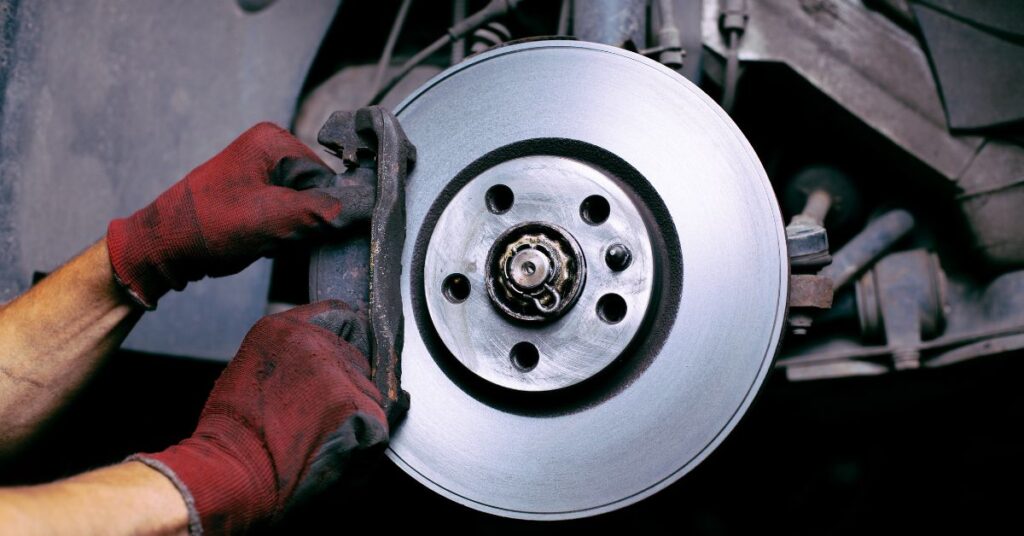
Table of Contents
Brakes are a crucial component of your car, but they are sometimes neglected until a significant issue arises. Since brakes and brake pads are pivotal for your vehicle’s safety, waiting until they malfunction is dangerous. It’s essential to stay alert to the signs that suggest you may need brake service. Here are the top ten indicators suggesting your car requires brake service.
1 – Soft or Spongy Brake Pedal
A soft or spongy feeling when you press the brake pedal often signals an underlying issue with your vehicle’s hydraulic system. Common culprits can be air trapped in the brake lines, malfunctioning calipers, a compromised flex line, or a deteriorating master cylinder. Another concern to look out for is a low brake fluid level in the master cylinder reservoir, which might allow air to infiltrate the system. Immediate attention is recommended to restore the brake system’s effectiveness and help improve safety.
2 – Hard Brake Pedal
Experiencing a stiff or hard brake pedal usually suggests problems within the power assist mechanism. Vehicles employ various systems to aid braking, such as vacuum, hydraulic, or electric systems. When these systems malfunction, the brake pedal can become more challenging to press down. It’s crucial to diagnose and rectify such issues early. The root cause may often be damaged connections or obstructions to the master cylinder.
3 – Leaking Fluid
Spotting brake fluid leaks is paramount for your vehicle’s safety. The hydraulic system, comprising numerous interconnected components, relies on fluid for effective braking. Common areas for leaks include the vicinity of the wheels and the junctions where rubber flex lines attach to brake calipers. Remember that even minor brake fluid leaks can escalate and diminish your vehicle’s braking capacity, necessitating urgent attention.
4 – Grinding Noise When Braking
A metallic grinding sound during braking is a telltale sign that your brake pads or shoes might be worn down to their metal base. This compromises the brake’s efficiency and can inflict further damage to rotors or drums. Such noises mandate immediate professional inspection. Depending on the severity, you might be advised to go ahead and replace both brake pads and rotors to reinstate optimal braking.
5 – Car Pulls Left or Right
If braking results in your car veering to one side, it indicates an imbalance in the brake system’s application on either side. Possible reasons include uneven wear of brake components or malfunctioning hardware, such as a jammed caliper or a defective wheel cylinder. To ensure uniform and safe braking, addressing such issues promptly and replacing brake components symmetrically is always recommended.
6 – Takes a Longer Time or Distance Brake
Should your vehicle start to take a noticeably longer distance or time to halt, you could be experiencing brake fade. Temporary brake fade might arise after continuous braking on steep declines, causing pads and rotors to overheat. Over time, if this issue persists, it suggests more advanced wear of the braking components, warranting replacements for optimal performance.
7 – Vibrations
Pulsations or vibrations felt through the brake pedal or steering wheel during braking often stem from warped rotors. Rotors can warp due to overheating, leading to uneven surfaces. Addressing this issue might involve machining the rotors to smooth them out or replacing them if the warping is extensive.
8 – Drag Under Acceleration
Even as the engine revs, a lag in acceleration suggests potential brake drag. This could be attributed to a sticking caliper or drum brake. Additionally, misadjusted drum brakes might prevent the brake shoes from retracting properly. Regular maintenance can preempt and address these issues, ensuring smoother vehicle performance.
9 – Strange Smells
A distinct burning odor during braking is a red flag. Overheated brakes can produce such a smell, signifying potential harm to the braking system. In severe cases, you might even notice smoke, indicating the friction lining is burning. Overheating diminishes the brake’s effectiveness in the short term and can lead to the long-term problem of brake fade.
10 – Dashboard Warning Lights
Dashboard brake warning lights are vital indicators of potential issues within the brake system. These lights should never be ignored, signaling problems with the primary brake system or the ABS. Especially alarming is the leading brake warning light, which often points to significant hydraulic system malfunctions and necessitates swift, professional inspection.
Schedule Brake Service with McCullough NAPA
If you experience any of the signs above, we urge you to bring your vehicle in to our shop for brake service. Waiting to have brake service performed is dangerous for you and everyone else on the road. The McCullough NAPA Auto Care technicians are all ASE-certified and equipped with the appropriate tools to diagnose your braking issues and make any repairs as needed. Contact us today to get started.
FAQ About Brake Service
If your brakes are making unusual noises, if the brake pedal feels soft or spongy, or if your car pulls to one side when braking, these are signs that your brakes may need service. Also, if you notice a longer stopping distance or vibrations when braking, it’s time for a check-up.
A grinding or squealing sound often indicates worn-out brake pads. Many brake pads also have a built-in wear indicator that produces a squeal when they need replacement. Additionally, if you can visually inspect the brake pad and see less than 1/4 inch of pad, it’s time to replace them.
The frequency for brake service varies based on driving habits and conditions. Generally, it’s a good practice to have your brakes checked annually or every 12,000 miles. However, always refer to your vehicle’s owner manual for specific recommendations.
Neglecting brake service can lead to reduced braking efficiency, increased stopping distances, and even total brake failure. This can endanger both the driver and others on the road. Additionally, delaying brake service can lead to more costly repairs in the future.
On average, brake pads last between 30,000 to 70,000 miles. However, this can vary widely based on the quality of the brake pads, driving conditions, and individual driving habits.

